Courses

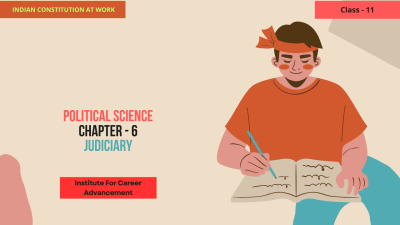
 Compare
Compare
Judiciary is a Class 11 chapter that likely explores the functions, powers, and structure of the judicial branch of government. It might delve into topics such as: The Judicial Branch: The role and importance of the judiciary in a democratic system. The Supreme Court: The structure, composition, and powers of the Supreme Court, including its role in interpreting the Constitution and protecting fundamental rights. The High Courts: The structure, composition, and powers of the high courts, including their jurisdiction and relationship with the Supreme Court. The Subordinate Courts: The structure, composition, and jurisdiction of subordinate courts, including district courts, sessions courts, and special courts. Judicial Review: The power of the judiciary to review the actions of the executive and legislative branches and declare them unconstitutional. Challenges and Issues: The challenges and issues faced by the judiciary, such as judicial delays, corruption, and the politicization of the judiciary. Overall, this chapter likely provides a comprehensive overview of the judicial branch of government, its functions, and its relationship with other branches of government. বিচার বিভাগ হল একাদশ শ্রেণীর একটি অধ্যায় যা সম্ভবত সরকারের বিচার বিভাগীয় শাখার কাজ, ক্ষমতা এবং কাঠামো অন্বেষণ করে। এটি নিম্নলিখিত বিষয়গুলি নিয়ে আলোচনা করতে পারেঃ বিচার বিভাগঃ গণতান্ত্রিক ব্যবস্থায় বিচার বিভাগের ভূমিকা ও গুরুত্ব। সুপ্রিম কোর্টঃ সংবিধানের ব্যাখ্যা এবং মৌলিক অধিকার রক্ষায় সুপ্রিম কোর্টের ভূমিকা সহ সুপ্রিম কোর্টের কাঠামো, গঠন এবং ক্ষমতা। উচ্চ আদালতঃ উচ্চ আদালতের কাঠামো, গঠন এবং ক্ষমতা, তাদের এখতিয়ার এবং সুপ্রিম কোর্টের সাথে সম্পর্ক সহ। অধস্তন আদালতঃ জেলা আদালত, দায়রা আদালত এবং বিশেষ আদালত সহ অধস্তন আদালতের কাঠামো, গঠন এবং এখতিয়ার। বিচার বিভাগীয় পর্যালোচনাঃ কার্যনির্বাহী ও আইন প্রণয়নকারী শাখার কার্যাবলী পর্যালোচনা করার এবং সেগুলিকে অসাংবিধানিক ঘোষণা করার বিচার বিভাগের ক্ষমতা। চ্যালেঞ্জ ও সমস্যাঃ বিচার বিভাগের চ্যালেঞ্জ ও সমস্যা, যেমন বিচারিক বিলম্ব, দুর্নীতি এবং বিচার বিভাগের রাজনীতিকরণ। সামগ্রিকভাবে, এই অধ্যায়টি সম্ভবত সরকারের বিচার বিভাগীয় শাখা, এর কার্যকারিতা এবং সরকারের অন্যান্য শাখার সাথে এর সম্পর্কের একটি বিস্তৃত বিবরণ প্রদান করে।
0 Lessons
Hours
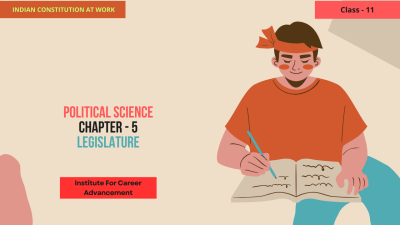
 Compare
Compare
0 Lessons
Hours

 Compare
Compare
Executive is a Class 11 chapter that likely explores the functions, powers, and responsibilities of the executive branch of government. It might delve into topics such as: The Executive Branch: The role and importance of the executive branch in a democratic system. The President and Vice President: The powers and responsibilities of the president and vice president, including their roles in the legislative and judicial processes. The Prime Minister: The role and powers of the prime minister as the head of government and leader of the cabinet. The Cabinet: The composition and functions of the cabinet, including the allocation of portfolios and decision-making processes. Bureaucracy: The role of the bureaucracy in implementing government policies and providing public services. Checks and Balances: The mechanisms in place to check the power of the executive branch, including the legislature and the judiciary. Overall, this chapter likely provides a comprehensive overview of the executive branch of government, its functions, and its relationship with other branches of government. নির্বাহী হল একাদশ শ্রেণীর একটি অধ্যায় যা সম্ভবত সরকারের নির্বাহী শাখার কাজ, ক্ষমতা এবং দায়িত্বগুলি অন্বেষণ করে। এটি নিম্নলিখিত বিষয়গুলি নিয়ে আলোচনা করতে পারেঃ নির্বাহী শাখাঃ গণতান্ত্রিক ব্যবস্থায় নির্বাহী শাখার ভূমিকা ও গুরুত্ব। রাষ্ট্রপতি ও সহ-রাষ্ট্রপতিঃ রাষ্ট্রপতি ও সহ-রাষ্ট্রপতির ক্ষমতা ও দায়িত্ব, আইন প্রণয়ন ও বিচার প্রক্রিয়ায় তাদের ভূমিকা সহ। প্রধানমন্ত্রীঃ সরকারের প্রধান এবং মন্ত্রিসভার নেতা হিসাবে প্রধানমন্ত্রীর ভূমিকা ও ক্ষমতা। মন্ত্রিসভাঃ পোর্টফোলিও বরাদ্দ এবং সিদ্ধান্ত গ্রহণের প্রক্রিয়া সহ মন্ত্রিসভার গঠন ও কার্যাবলী। আমলাতন্ত্রঃ সরকারি নীতি বাস্তবায়নে এবং জনসেবা প্রদানে আমলাতন্ত্রের ভূমিকা। চেক এবং ব্যালেন্সঃ আইনসভা এবং বিচার বিভাগ সহ কার্যনির্বাহী শাখার ক্ষমতা পরীক্ষা করার জন্য ব্যবস্থা। সামগ্রিকভাবে, এই অধ্যায়টি সম্ভবত সরকারের নির্বাহী শাখা, এর কার্যকারিতা এবং সরকারের অন্যান্য শাখার সাথে এর সম্পর্কের একটি বিস্তৃত বিবরণ প্রদান করে।
0 Lessons
Hours
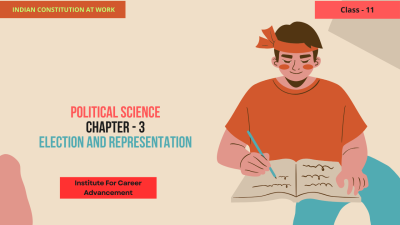
 Compare
Compare
Election and Representation is a Class 11 chapter that likely explores the principles and processes of elections and representation in a democratic system. It might delve into topics such as: Electoral Systems: Different electoral systems, including first-past-the-post, proportional representation, and mixed systems. Voting Rights and Eligibility: The criteria for voting eligibility, including citizenship, age, and other requirements. The Electoral Process: The steps involved in conducting elections, from voter registration and campaigning to polling day and counting ballots. Representation: The concept of representation, including the different types of representatives (elected, appointed, and nominated) and the responsibilities of elected representatives. Challenges and Issues: The challenges and issues associated with elections, such as voter turnout, electoral fraud, and gerrymandering. Overall, this chapter likely provides a comprehensive overview of the principles and practices of elections and representation in a democratic system, helping students understand the importance of participation in the political process. নির্বাচন ও প্রতিনিধিত্ব হল একাদশ শ্রেণীর একটি অধ্যায় যা সম্ভবত একটি গণতান্ত্রিক ব্যবস্থায় নির্বাচন ও প্রতিনিধিত্বের নীতি ও প্রক্রিয়াগুলি অন্বেষণ করে। এটি নিম্নলিখিত বিষয়গুলি নিয়ে আলোচনা করতে পারেঃ নির্বাচনী ব্যবস্থাঃ প্রথম-অতীত-পরবর্তী, আনুপাতিক প্রতিনিধিত্ব এবং মিশ্র ব্যবস্থা সহ বিভিন্ন নির্বাচনী ব্যবস্থা। ভোটদানের অধিকার এবং যোগ্যতাঃ নাগরিকত্ব, বয়স এবং অন্যান্য প্রয়োজনীয়তা সহ ভোটদানের যোগ্যতার মানদণ্ড। নির্বাচনী প্রক্রিয়াঃ ভোটার নিবন্ধন এবং প্রচারণা থেকে শুরু করে ভোটের দিন এবং ব্যালট গণনা পর্যন্ত নির্বাচন পরিচালনার সাথে জড়িত পদক্ষেপ। প্রতিনিধিত্বঃ বিভিন্ন ধরনের প্রতিনিধি (নির্বাচিত, নিযুক্ত এবং মনোনীত) এবং নির্বাচিত প্রতিনিধিদের দায়িত্ব সহ প্রতিনিধিত্বের ধারণা। সমস্যা ও সমস্যাঃ নির্বাচনের সাথে সম্পর্কিত চ্যালেঞ্জ এবং বিষয়গুলি, যেমন ভোটারদের উপস্থিতি, নির্বাচনী জালিয়াতি এবং গেরিম্যান্ডারিং। সামগ্রিকভাবে, এই অধ্যায়টি সম্ভবত নির্বাচনের নীতি ও অনুশীলন এবং গণতান্ত্রিক ব্যবস্থায় প্রতিনিধিত্বের একটি বিস্তৃত পর্যালোচনা প্রদান করে, যা শিক্ষার্থীদের রাজনৈতিক প্রক্রিয়ায় অংশগ্রহণের গুরুত্ব বুঝতে সহায়তা করে।
0 Lessons
Hours
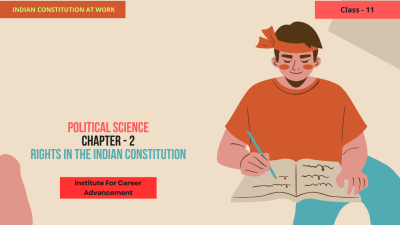
 Compare
Compare
Rights in the Indian Constitution is a Class 11 chapter that likely explores the fundamental rights guaranteed to Indian citizens under the Constitution. It might delve into topics such as: Fundamental Rights: The different categories of fundamental rights, including the right to equality, freedom, life and liberty, cultural and educational rights, and property rights. Constitutional Provisions: The specific provisions in the Constitution that guarantee these rights, such as Article 14 (equality before the law), Article 19 (freedom of speech and expression), and Article 21 (right to life and liberty). Limitations on Fundamental Rights: The circumstances under which fundamental rights can be restricted or suspended, such as in the interests of national security or public order. Enforcement of Fundamental Rights: The mechanisms for enforcing fundamental rights, including judicial review and the role of the Supreme Court. Significance of Fundamental Rights: The importance of fundamental rights in protecting individual liberties, promoting social justice, and ensuring the democratic character of the Indian state. Overall, this chapter likely provides a comprehensive overview of the fundamental rights guaranteed to Indian citizens under the Constitution, their significance, and the mechanisms for their enforcement. ভারতীয় সংবিধানের অধিকার হল একাদশ শ্রেণীর একটি অধ্যায় যা সম্ভবত সংবিধানের অধীনে ভারতীয় নাগরিকদের প্রদত্ত মৌলিক অধিকারগুলি অন্বেষণ করে। এটি নিম্নলিখিত বিষয়গুলি নিয়ে আলোচনা করতে পারেঃ মৌলিক অধিকারঃ সমতা, স্বাধীনতা, জীবন ও স্বাধীনতা, সাংস্কৃতিক ও শিক্ষাগত অধিকার এবং সম্পত্তির অধিকার সহ মৌলিক অধিকারের বিভিন্ন বিভাগ। সাংবিধানিক বিধানঃ সংবিধানের নির্দিষ্ট বিধানগুলি যা এই অধিকারগুলির নিশ্চয়তা দেয়, যেমন অনুচ্ছেদ 14 (আইনের সামনে সমতা) অনুচ্ছেদ 19 (বাক ও মত প্রকাশের স্বাধীনতা) এবং অনুচ্ছেদ 21 (জীবন ও স্বাধীনতার অধিকার) মৌলিক অধিকারের সীমাবদ্ধতা-যে পরিস্থিতিতে মৌলিক অধিকারগুলিকে সীমাবদ্ধ বা স্থগিত করা যেতে পারে, যেমন জাতীয় নিরাপত্তা বা জনশৃঙ্খলার স্বার্থে। মৌলিক অধিকারের প্রয়োগঃ বিচার বিভাগীয় পর্যালোচনা এবং সুপ্রিম কোর্টের ভূমিকা সহ মৌলিক অধিকার প্রয়োগের প্রক্রিয়া। মৌলিক অধিকারের গুরুত্বঃ ব্যক্তিগত স্বাধীনতা রক্ষা, সামাজিক ন্যায়বিচারের প্রচার এবং ভারতীয় রাষ্ট্রের গণতান্ত্রিক চরিত্র নিশ্চিত করার ক্ষেত্রে মৌলিক অধিকারের গুরুত্ব। সামগ্রিকভাবে, এই অধ্যায়টি সম্ভবত সংবিধানের অধীনে ভারতীয় নাগরিকদের যে মৌলিক অধিকারের নিশ্চয়তা দেওয়া হয়েছে, সেগুলির তাৎপর্য এবং সেগুলির প্রয়োগের প্রক্রিয়া সম্পর্কে একটি বিস্তৃত বিবরণ প্রদান করে।
0 Lessons
Hours
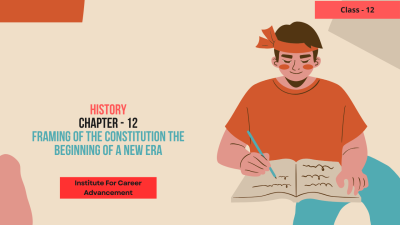
 Compare
Compare
Framing of the Constitution: The Beginning of a New Era is a Class 12 chapter that likely explores the process of drafting and adopting the Indian Constitution, the founding principles that shaped it, and its significance as a milestone in India's history. It might delve into topics such as: Constituent Assembly: The formation and composition of the Constituent Assembly, the body responsible for drafting the Constitution. Founding Principles: The key principles that guided the drafting of the Constitution, including secularism, democracy, socialism, and justice. Key Features of the Constitution: The major provisions of the Constitution, such as the preamble, fundamental rights, fundamental duties, and the structure of government. Challenges and Debates: The challenges and debates that arose during the drafting process, including issues related to federalism, language, and social justice. Significance of the Constitution: The significance of the Indian Constitution as a landmark document in India's history and its role in shaping the nation's democratic values and institutions. Overall, this chapter likely provides a comprehensive overview of the process of framing the Indian Constitution, the key principles that underpin it, and its enduring significance as a foundation for Indian democracy. সংবিধানের গঠনঃ নতুন যুগের সূচনা হল দ্বাদশ শ্রেণির একটি অধ্যায় যা সম্ভবত ভারতীয় সংবিধানের খসড়া তৈরি ও গ্রহণের প্রক্রিয়া, যে প্রতিষ্ঠাতা নীতিগুলি এটিকে রূপ দিয়েছে এবং ভারতের ইতিহাসে একটি মাইলফলক হিসাবে এর তাৎপর্য অন্বেষণ করে। এটি নিম্নলিখিত বিষয়গুলি নিয়ে আলোচনা করতে পারেঃ গণপরিষদঃ গণপরিষদের গঠন ও গঠন, সংবিধানের খসড়া প্রণয়নের জন্য দায়ী সংস্থা। প্রতিষ্ঠার মূলনীতিঃ ধর্মনিরপেক্ষতা, গণতন্ত্র, সমাজতন্ত্র এবং ন্যায়বিচার সহ সংবিধানের খসড়া প্রণয়নের মূল নীতিগুলি। সংবিধানের প্রধান বৈশিষ্ট্যঃ সংবিধানের প্রধান বিধানগুলি, যেমন প্রস্তাবনা, মৌলিক অধিকার, মৌলিক কর্তব্য এবং সরকারের কাঠামো। চ্যালেঞ্জ এবং বিতর্কঃ ফেডারেলিজম, ভাষা এবং সামাজিক ন্যায়বিচার সম্পর্কিত বিষয়গুলি সহ খসড়া প্রক্রিয়া চলাকালীন উত্থাপিত চ্যালেঞ্জ এবং বিতর্ক। সংবিধানের তাৎপর্যঃ ভারতের ইতিহাসে একটি যুগান্তকারী দলিল হিসাবে ভারতীয় সংবিধানের তাৎপর্য এবং দেশের গণতান্ত্রিক মূল্যবোধ ও প্রতিষ্ঠান গঠনে এর ভূমিকা। সামগ্রিকভাবে, এই অধ্যায়টি সম্ভবত ভারতীয় সংবিধান প্রণয়নের প্রক্রিয়া, এর মূল নীতিগুলি এবং ভারতীয় গণতন্ত্রের ভিত্তি হিসাবে এর স্থায়ী তাৎপর্য সম্পর্কে একটি বিস্তৃত বিবরণ প্রদান করে।
0 Lessons
Hours

 Compare
Compare
Mahatma Gandhi and the National Movement: Civil Disobedience and Beyond is a Class 12 chapter that likely explores the role of Mahatma Gandhi in India's struggle for independence and his philosophy of nonviolent resistance. It might delve into topics such as: Gandhi's Early Life and Career: Gandhi's upbringing, education, and early experiences in South Africa, which shaped his political and social philosophy. Return to India and the National Movement: Gandhi's return to India and his involvement in the Indian National Congress, his adoption of the strategy of satyagraha (truth force), and his leadership of the national movement. Civil Disobedience Movements: The major civil disobedience campaigns led by Gandhi, including the Non-Cooperation Movement, the Salt March, and the Quit India Movement. Gandhi's Philosophy and Ideology: Gandhi's ideas on nonviolence, truth, and social justice, as well as his critique of Western civilization and his vision for an independent India. Legacy of Gandhi: Gandhi's impact on the Indian independence movement, his influence on global movements for peace and justice, and his continuing relevance in contemporary society. Overall, this chapter likely provides a comprehensive overview of Mahatma Gandhi's life, his contributions to the Indian independence movement, and his enduring legacy. মহাত্মা গান্ধী অ্যান্ড দ্য ন্যাশনাল মুভমেন্টঃ সিভিল ডিসওবিডেন্স অ্যান্ড বিয়ন্ড একটি দ্বাদশ শ্রেণির অধ্যায় যা সম্ভবত ভারতের স্বাধীনতা সংগ্রামে মহাত্মা গান্ধীর ভূমিকা এবং তাঁর অহিংস প্রতিরোধের দর্শনের অন্বেষণ করে। এটি নিম্নলিখিত বিষয়গুলি নিয়ে আলোচনা করতে পারেঃ গান্ধীর প্রাথমিক জীবন ও কর্মজীবনঃ গান্ধীর লালন-পালন, শিক্ষা এবং দক্ষিণ আফ্রিকায় প্রাথমিক অভিজ্ঞতা, যা তাঁর রাজনৈতিক ও সামাজিক দর্শনকে রূপ দিয়েছে। ভারতে ফিরে আসা এবং জাতীয় আন্দোলনঃ গান্ধীর ভারতে প্রত্যাবর্তন এবং ভারতীয় জাতীয় কংগ্রেসে তাঁর অংশগ্রহণ, সত্যাগ্রহ (সত্য শক্তি) কৌশল গ্রহণ এবং জাতীয় আন্দোলনে তাঁর নেতৃত্ব। আইন অমান্য আন্দোলনঃ অসহযোগ আন্দোলন, লবণ মিছিল এবং ভারত ছাড়ো আন্দোলন সহ গান্ধীর নেতৃত্বে প্রধান আইন অমান্য অভিযান। গান্ধীর দর্শন ও মতাদর্শঃ অহিংসা, সত্য এবং সামাজিক ন্যায়বিচারের উপর গান্ধীর ধারণাগুলি, পাশাপাশি পশ্চিমা সভ্যতা এবং একটি স্বাধীন ভারতের জন্য তাঁর দৃষ্টিভঙ্গির সমালোচনা। গান্ধীর উত্তরাধিকারঃ ভারতীয় স্বাধীনতা আন্দোলনে গান্ধীর প্রভাব, শান্তি ও ন্যায়বিচারের জন্য বিশ্বব্যাপী আন্দোলনে তাঁর প্রভাব এবং সমসাময়িক সমাজে তাঁর অব্যাহত প্রাসঙ্গিকতা। সামগ্রিকভাবে, এই অধ্যায়টি সম্ভবত মহাত্মা গান্ধীর জীবন, ভারতীয় স্বাধীনতা আন্দোলনে তাঁর অবদান এবং তাঁর স্থায়ী উত্তরাধিকার সম্পর্কে একটি বিস্তৃত বিবরণ প্রদান করে।
0 Lessons
Hours
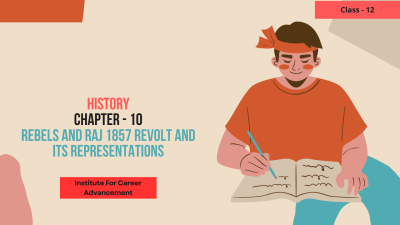
 Compare
Compare
Rebels and Raj: 1857 Revolt and Its Representations is a Class 12 chapter that likely explores the 1857 Revolt against British colonial rule in India and the various ways in which it has been portrayed and interpreted. It might delve into topics such as: Causes and Outbreak: The factors that led to the 1857 Revolt, including economic grievances, cultural and religious tensions, and military discontent. Key Events and Figures: The major events and personalities associated with the Revolt, including the role of sepoys, princes, and religious leaders. British Response and Suppression: The British government's response to the Revolt, including military actions, political reforms, and the reassertion of colonial authority. Representations in Literature and Art: The ways in which the Revolt has been depicted in literature, art, and other cultural forms, including its portrayal as a struggle for independence, a religious uprising, or a social rebellion. Historical Interpretations: The different historical interpretations of the Revolt, including nationalist, colonial, and Marxist perspectives. Overall, this chapter likely provides a comprehensive overview of the 1857 Revolt, its significance in Indian history, and the ways in which it has been remembered and understood. বিদ্রোহী এবং রাজঃ 1857 বিদ্রোহ এবং এর প্রতিনিধিত্ব একটি দ্বাদশ শ্রেণির অধ্যায় যা সম্ভবত ভারতে ব্রিটিশ ঔপনিবেশিক শাসনের বিরুদ্ধে 1857 সালের বিদ্রোহ এবং বিভিন্ন উপায়ে এটি চিত্রিত ও ব্যাখ্যা করা হয়েছে। এটি নিম্নলিখিত বিষয়গুলি নিয়ে আলোচনা করতে পারেঃ কারণ এবং প্রাদুর্ভাবঃ অর্থনৈতিক অভিযোগ, সাংস্কৃতিক ও ধর্মীয় উত্তেজনা এবং সামরিক অসন্তোষ সহ 1857 সালের বিদ্রোহের কারণগুলি। মূল ঘটনা ও পরিসংখ্যানঃ সিপাহী, রাজকুমার এবং ধর্মীয় নেতাদের ভূমিকা সহ বিদ্রোহের সাথে যুক্ত প্রধান ঘটনা এবং ব্যক্তিত্ব। ব্রিটিশ প্রতিক্রিয়া ও দমনঃ সামরিক পদক্ষেপ, রাজনৈতিক সংস্কার এবং ঔপনিবেশিক কর্তৃত্বের পুনর্বিবেচনা সহ বিদ্রোহের প্রতি ব্রিটিশ সরকারের প্রতিক্রিয়া। সাহিত্য ও শিল্পে প্রতিনিধিত্বঃ স্বাধীনতা সংগ্রাম, ধর্মীয় বিদ্রোহ বা সামাজিক বিদ্রোহ হিসাবে এর চিত্র সহ সাহিত্য, শিল্প এবং অন্যান্য সাংস্কৃতিক রূপগুলিতে বিদ্রোহকে যেভাবে চিত্রিত করা হয়েছে। ঐতিহাসিক ব্যাখ্যাঃ জাতীয়তাবাদী, ঔপনিবেশিক এবং মার্কসবাদী দৃষ্টিভঙ্গি সহ বিদ্রোহের বিভিন্ন ঐতিহাসিক ব্যাখ্যা। সামগ্রিকভাবে, এই অধ্যায়টি সম্ভবত 1857 সালের বিদ্রোহ, ভারতীয় ইতিহাসে এর তাৎপর্য এবং কীভাবে এটি স্মরণ ও বোঝা হয়েছে তার একটি বিস্তৃত বিবরণ প্রদান করে।
0 Lessons
Hours

 Compare
Compare
Colonialism and the Countryside: Exploring Official Archives is a Class 12 chapter that likely delves into the impact of British colonialism on rural India, focusing on the analysis of official archives. It might explore topics such as: British Colonial Policies: The land reforms, revenue systems, and administrative structures implemented by the British in rural India. Official Archives: The nature and content of official archives, including land records, revenue records, and administrative reports. Analyzing Archival Sources: The methods and techniques used to analyze archival sources, including critical reading, interpretation, and contextualization. Impact of Colonialism on Rural Life: The social, economic, and cultural changes brought about by British colonialism in rural areas, such as land alienation, forced labor, and changes in agricultural practices. Resistance and Adaptation: The ways in which rural communities resisted or adapted to British colonial rule, including forms of protest, cultural preservation, and economic strategies. Overall, this chapter likely provides a comprehensive overview of the impact of British colonialism on rural India, using official archives as a primary source of evidence. It offers insights into the social, economic, and cultural changes that occurred during this period, as well as the ways in which rural communities responded to colonial rule. উপনিবেশবাদ এবং গ্রামাঞ্চলঃ অফিসিয়াল আর্কাইভ অন্বেষণ এটি দ্বাদশ শ্রেণির একটি অধ্যায় যা সম্ভবত গ্রামীণ ভারতে ব্রিটিশ উপনিবেশবাদের প্রভাবের উপর আলোকপাত করে, সরকারী সংরক্ষণাগারগুলির বিশ্লেষণের উপর দৃষ্টি নিবদ্ধ করে। এটি নিম্নলিখিত বিষয়গুলি অন্বেষণ করতে পারেঃ ব্রিটিশ ঔপনিবেশিক নীতিঃ গ্রামীণ ভারতে ব্রিটিশদের দ্বারা বাস্তবায়িত ভূমি সংস্কার, রাজস্ব ব্যবস্থা এবং প্রশাসনিক কাঠামো। অফিসিয়াল আর্কাইভসঃ ভূমি রেকর্ড, রাজস্ব রেকর্ড এবং প্রশাসনিক প্রতিবেদন সহ অফিসিয়াল আর্কাইভের প্রকৃতি এবং বিষয়বস্তু। সংরক্ষণাগার উৎস বিশ্লেষণঃ সমালোচনামূলক পাঠ, ব্যাখ্যা এবং প্রাসঙ্গিককরণ সহ সংরক্ষণাগার উৎস বিশ্লেষণের জন্য ব্যবহৃত পদ্ধতি এবং কৌশল। গ্রামীণ জীবনে উপনিবেশবাদের প্রভাবঃ গ্রামাঞ্চলে ব্রিটিশ উপনিবেশবাদ দ্বারা আনা সামাজিক, অর্থনৈতিক ও সাংস্কৃতিক পরিবর্তন, যেমন ভূমি বিচ্ছিন্নতা, জোরপূর্বক শ্রম এবং কৃষি পদ্ধতিতে পরিবর্তন। প্রতিরোধ ও অভিযোজনঃ প্রতিবাদ, সাংস্কৃতিক সংরক্ষণ এবং অর্থনৈতিক কৌশল সহ গ্রামীণ সম্প্রদায়গুলি যেভাবে ব্রিটিশ ঔপনিবেশিক শাসনের বিরোধিতা করেছিল বা মানিয়ে নিয়েছিল। সামগ্রিকভাবে, এই অধ্যায়টি সম্ভবত গ্রামীণ ভারতে ব্রিটিশ উপনিবেশবাদের প্রভাবের একটি বিস্তৃত পর্যালোচনা প্রদান করে, সরকারী সংরক্ষণাগারগুলিকে প্রমাণের প্রাথমিক উৎস হিসাবে ব্যবহার করে। এটি এই সময়কালে ঘটে যাওয়া সামাজিক, অর্থনৈতিক এবং সাংস্কৃতিক পরিবর্তনের পাশাপাশি গ্রামীণ সম্প্রদায়গুলি ঔপনিবেশিক শাসনের প্রতি কীভাবে প্রতিক্রিয়া জানিয়েছিল সে সম্পর্কে অন্তর্দৃষ্টি প্রদান করে।
0 Lessons
Hours